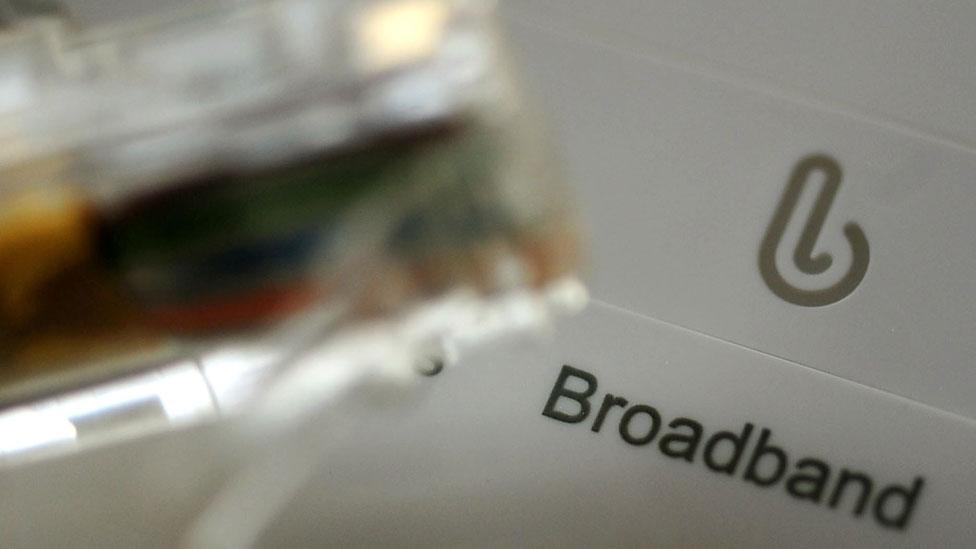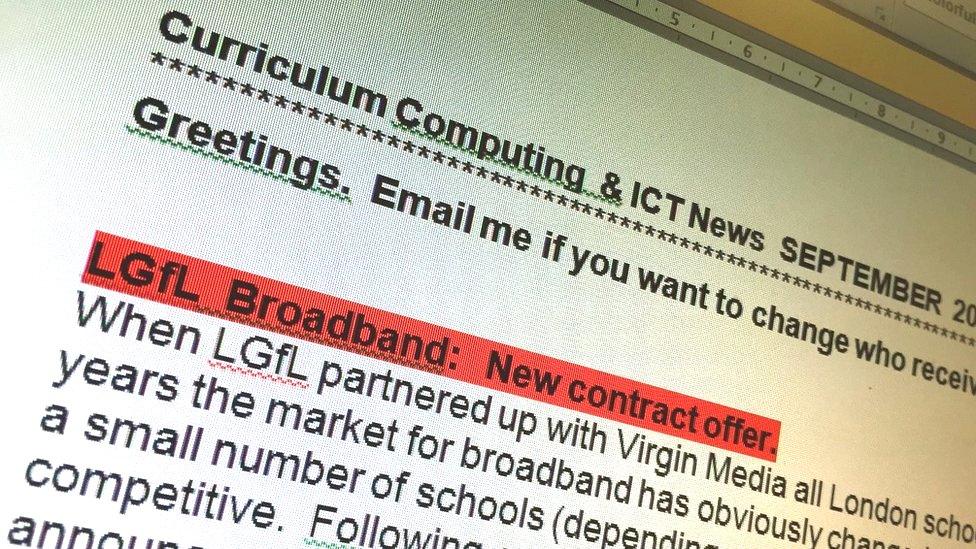Budget broadband deal emails hidden from London schools
- Published

Choosing a broadband supplier is an important decision for any school. But schools across London are being prevented from receiving emails from a company that wants to compete for their broadband contract.
London Grid for Learning - the council organisation which negotiates broadband contracts for 2,500 schools in the capital - has admitted that it is blocking emails from Exa Networks, a firm which supplies a similar service.
"It's just wrong, it's anti-competitive," Mark Cowgill, Exa's chief executive, told me.
London schools could be missing out on cheaper broadband deals as Marc Ashdown explains
Mr Cowgill has complained to the Competition and Markets Authority and said he also had evidence that unfair pressure had been applied to schools to quickly renew their broadband deals with LGfL.
LGfL said it had blocked emails after a mailshot from Exa, which its network had detected as spam, and insisted it acted in the best interest of schools. But Mr Cowgill denied his firm's messages were spam and said emails were only sent to London schools after initial contacts had been made.

Then Exa staff found that they were getting no responses and teachers confirmed the emails had never arrived. "It's not allowing schools to make sure they get value for money," Mr Cowgill told me.
"How can they, if they can't compare different offers?"
A five-year deal agreed in 2011 between LGfL and Virgin Media to supply broadband across the capital is now up for renewal, and schools are being advised in strong terms that they should sign up for another five years.
The BBC has seen a memo sent to schools in Ealing by a council IT consultant telling them "beware of offers from companies such as Schools Broadband, RM, Exa, etc."
It then says, "if you ARE stubbornly still tempted to waste your time looking elsewhere...", external, before going on to claim that no rival can offer the same service that LGfL and its partners can provide.
The document ends: "Easiest decision you ever need to make!"
The email is written by Mark Robinson, who as well as being an IT consultant for Ealing Council is a director of LGfL.
A spokeswoman for Ealing Council said: "Schools have complete freedom to choose whichever broadband services they subscribe to and there is no commercial advantage for the council or any of its employees in choosing LGfL's service."
In another document seen by the BBC the LGfL chief executive Brian Durrant writes to a primary school in Whitechapel urging the renewal of its five-year broadband contract. The school is told it can have a 20% reduction in its annual £7,462 payment and a tripling of speed, but only if it signs up within a fortnight.
Mark Cowgill of Exa says his firm could offer much better terms and a one-year deal.
"Five year contracts just don't make sense," he said.
"When you look at historical prices for bandwidth, the price only goes down."

But Brian Durrant insisted that LGfL, which supplies 33 London councils, had produced great savings by purchasing collectively.
"The value, quality and fitness-for-purpose which is achieved far exceeds what could be achieved by schools acting individually," he said.
Mr Durrant added that LGfL's status as a charitable trust allowed it to put all its resources into securing better services for schools at a lower price than a commercial company could offer.
But Mark Cowgill of Exa said that was not borne out by the facts. He said that LGfl currently charged London primary schools £7,462 a year for five years, while his firm charged £3,500 in the first year, followed by £2,500 in subsequent years.
He conceded that the LGfL deal included a range of free content and web tools but said much of that was irrelevant for most teachers.
"95% of schools don't use any of that," he added.
"They use free services like Skype, not specialised stuff."
He said the potential savings for secondary schools were much larger and calculated that schools across London could save more than £50m if they switched to the cheaper options provided by his firm and other commercial suppliers.

Ealing schools received a letter advising them not to "waste their time" looking at rival deals
Dunraven School in Streatham in South London has used LGfL's services for some years and is now being invited to renew its contract until 2021. The school's director of finance Micon Metcalfe told the BBC that Dunraven only used the broadband and not the organisation's other services and was looking at other suppliers.
"It's almost disbelief," she said when we asked what she felt about the blocking of email from Exa. "It's not fair on schools."
She also felt LGfL was applying too much pressure to renew the contract.
"It may well be the best deal, but what I want is the time to think about it and decide it's the best offer," she said.
At the end of last week, after being asked about its tactics, LGfL sent another letter to schools apologising for putting them under pressure to renew their broadband deals.
"We think we made a mistake," the letter said. "And gave too little information about timescales for response, putting unnecessary pressure on schools."
But the charitable trust still said that by coming together to buy broadband and other IT services the schools were getting more for less and it urged them to continue to trust LGfL.